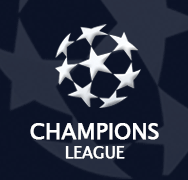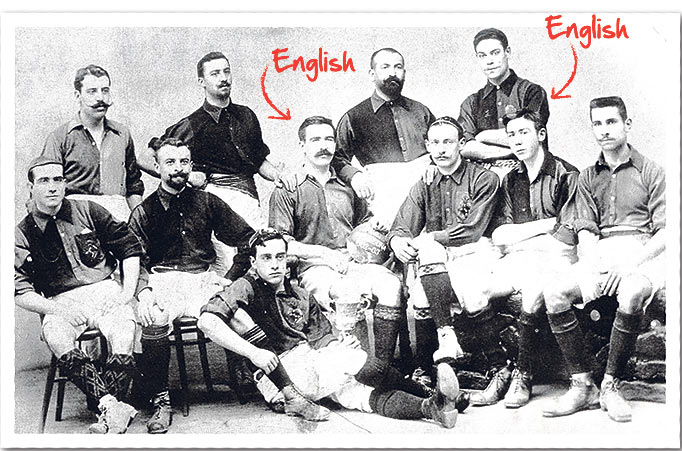FC Barcelona are almost as firmly rooted in Britain as Wembley rivals Manchester United.
It was a band of nomadic Brits who formed the nucleus of the Spanish giants way back in 1899, and today even their badge bears St George’s Cross.
In November 1899 the Brits responded to an advert in Barcelona newspaper Los Deportes.
Part of it read: “Our friend and companion Hans Gamper, former Swiss (football) champion, being keen on organising some football games in the city asks anyone who feels enthusiastic enough to present themselves at the office of this newspaper any Tuesday or Friday between nine and 11pm.”
Three Englishmen were among the prospective players who turned up – Walter Wild and brothers John and William Parsons. They were soon joined by countrymen Arthur and Ernest Witty.
Wild was duly elected as the first president of the newly formed “Football Club Barcelona”.
FC Barcelona expert Simon Harris, author of Going Native In Catalonia, explains: “In the early days, the club was made up of mainly foreigners.
“Of major significance are Ernest and Arthur Witty. They quickly emerged as skilful players, making sure Barca consistently beat local rivals FC Catala.
“This success, combined with the fact that the club bore the name of its home city, laid the foundations of FCB as the sporting representative of the Catalan nation.”
Arthur Witty’s grandson Michael, 74, remains a Barcelona resident and remembers his grandfather with affection and admiration.
The retired business consultant says: “He was a strong, bulky man who used to weigh around 15st.
“He adored football. He and his brother Ernest said they got bored with the only other sport that existed at the time – drinking gin – and would challenge each other to running races.
“Finally they joined the team organised by their great friends Hans Gamper and John and William Parsons and set about building the club.
“My grandfather had some golden rules dictating how the game should be played. He always said that fair play was paramount.”
Arthur was rewarded with the presidency of FC Barcelona in 1903, when the team included another Englishman, Stanley Harris.
He was also responsible for importing from England the first regulation-size balls and introducing goal nets to the club.
During his period in charge he promoted a series of local youngsters to the first team – including Comamala, Hornos, Quirante and Soler, who became the side’s first local heroes.
They are the players whose boots are now filled by the likes of Puyol, Busquets and Iniesta. The team also played their first international matches during Arthur’s presidency.
According to Simon Harris, the Witty brothers’ British schooling had a huge influence on the club.
He explains: “Arthur, a forward, and his brother Ernest, a defender, had been pupils at Merchant Taylors’ school, in Crosby, on Merseyside.
“It can’t be coincidence that Barça play in the same colours as Merchant Taylors’, blue and crimson.”
Those colours – known in Spain as Blaugrana – are now synonymous with Barca.
Michaela Riches, spokesperson for the school, says the current pupils are immensely proud of their links with the Witty brothers and Barcelona FC.
She says: “The story goes that Arthur scored an early winning goal for Barcelona wearing the rugby kit he used to wear here. There are various stories about how the famous Barcelona kit colours were adopted but this does seem logical.
“What is certain is that there are a growing number of Barcelona fans among our current pupils and they will all be cheering on their old school team this weekend.”
Michael will also be willing his grandfather’s club to win.
He says: “When I was at school in England my grandfather would always send me newspaper clippings showing the Barcelona results underlined.
“He would love the current team, he was very keen on home-grown players and he would be so proud of the fact that eight of the Barca team were brought up here.” The English influence at the club grew in 1917 when Barca’s first full-time manager was appointed.
He was Jack Greenwell, who had played non-league football in England for his home town team Crook Town, in Co Durham.
He quit in 1923 but was so well regarded he was brought back again as manager in 1931.
He succeeded former Burnley player Jim Bellamy – and took the club back to the top of the league.
Later in the decade, as the Spanish Civil War raged and dictator General Franco began his rise to power, the club became a rallying point for the Catalan people against the fascist dictator.
They would smuggle their flags into the old stadium and it was one of the few places they could converse in their native language, which the Spanish government had banned.
Only former star player Dutch legend Johan Cruyff has ever spent more time in charge of playing affairs at the club.
Jack was one of seven English managers, a list that also includes the late, much-loved Bobby Robson.
But perhaps the man who had the most influence on one of the side’s previous golden eras was Terry Venables, now a columnist with The Sun. They went from strength to strength under his stewardship from 1984, including winning their first league title for 11 years.
El Tel, as he was dubbed, signed big names including Brit big-hitters Steve Archibald and Mark Hughes.
His real coup, though, was taking Gary Lineker to the side’s iconic Camp Nou stadium. He paid almost £3million for the England goal-poacher, a fortune for a player in the Eighties.
Lineker went on to become yet another in the long line of UK names to make a name as a hero in the Barcelona camp, particulary after a hat-trick in a 3-2 win over arch rivals Real Madrid.

